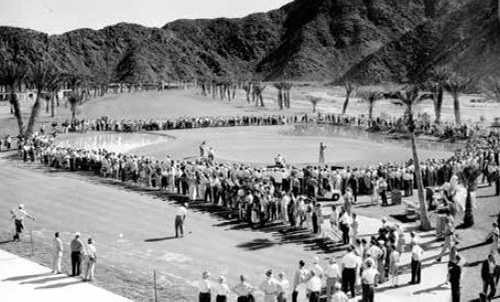THE RYDER CUP FINALLY RETURNS TO CALIFORNIA IN 2032
I READ A QUOTE the other day from the colorful and venerable Jackie Burke Jr., still going strong at 97, who once said, “To succeed at golf, you have to master the art of not being embarrassed.”
That made me think of Hunter Mahan, and both Burke and Mahan made me think of the wonders of the Ryder Cup, golf’s version of a Game 7 in the World Series and the last five minutes of a tight Notre Dame-USC football game. That also got me to thinking about the desert courses Thunderbird and Eldorado and their oft-forgotten piece of Southern California golf lore.
I will explain.
Burke, the oldest living Masters champion (1956), played in five straight Ryder Cups and has, to this day, the second-best Ryder Cup winning percentage record for the U.S. at 7-1, behind Jimmy Demaret’s 6-0. In 1955, Burke was on a U.S. team that beat Great Britain 8-4, extending the U.S. winning streak to 21 years. He won all four of his matches that year. In ’57, he was the playing captain when Great Britain finally broke the U.S. winning streak. And in 1959, he was with the U.S. team, but didn’t play because of a hand injury, when the Yanks regained the Cup, 8 ½-3 ½.
The Cup was contested in ’55 at Thunderbird in Rancho Mirage and in ’59 at Eldorado in Indian Wells. That’s the oft-forgotten part. The Ryder Cup hasn’t been within 1,500 miles of Southern California since. Sad but true, this is explained by international television times and tough desert heat in the autumn time frame when the Ryder Cup is played. The TV time issue will be tested in 2032, when the Ryder Cup comes to the Olympic Club in San Francisco. But, apparently for the foreseeable future, the Southland will remain in Ryder Cup lore as a 60-something-year-old memory.
That is somewhat unexplainable when you consider that Southern California has more wonderful, plush, challenging, photogenic courses than 95 percent of the world. A Ryder Cup creates emotion well beyond cheering for one guy against another in a major. You have two teams — one representing the most glamorous country in the world and the other an entire continent. If that doesn’t stir fan enthusiasm, nothing will. The majors are life-changing for golfers, but so, too, is the Ryder Cup.
I reported in person on the 2010 Ryder Cup for the L.A Times on a rainy, miserable weekend in Wales. The Europeans clinched the cup when Mahan, in the anchor singles match against Graeme McDowell, left his tee shot short on the par-three No. 17 and chunked his chip.
That sent the Europeans and their fans into a frenzy of celebration, with the players standing on a balcony above the 18th green and pouring huge bottles of champagne on each other and their delirious fans below.
Soon, Mahan had to face the media. With fame and Ryder Cup prominence comes this downside. He sat at a long table with the other U.S. players and captain Corey Pavin. Like wedge blockers on a football line, veterans Zach Johnson and Phil Mickelson sat on each side of a teary-eyed Mahan, either deflecting or answering the toughest questions.
That’s the Ryder Cup. You play for more than just yourself, for a zillion people. That means you need to answer to them, too, making it bigger than big.
The Ryder Cup has created legendary moments with legendary labels: The War on the Shore, The Battle of Brookline, the Miracle of Medinah. When the Brits finally got the Cup back, in 1957, golf writer supreme Henry Longhurst hyperbolized: “The British have slewed the Goliaths of American Golf.”
It was less celebrated when the Ryder Cup was played at Thunderbird and Eldorado. Herbert Warren Wind opined in Sports Illustrated that the event went on “despite the distraction of the flora and fauna of Palm Springs…”
Next year, the Ryder Cup will be at Whistling Straits in Sheboygan, Wisconsin, 2,052 miles to the east. Nice place. I grew up there. Tough course. I have humiliated myself there four or five times, where I worked on Jackie Burke’s art of “not being embarrassed.”
If Burke’s health permits, the Ryder Cup people should interview him during the event. He might talk about Thunderbird and Eldorado and somebody could get the hint that there should be a Ryder Cup somewhere in Southern California’s future.


